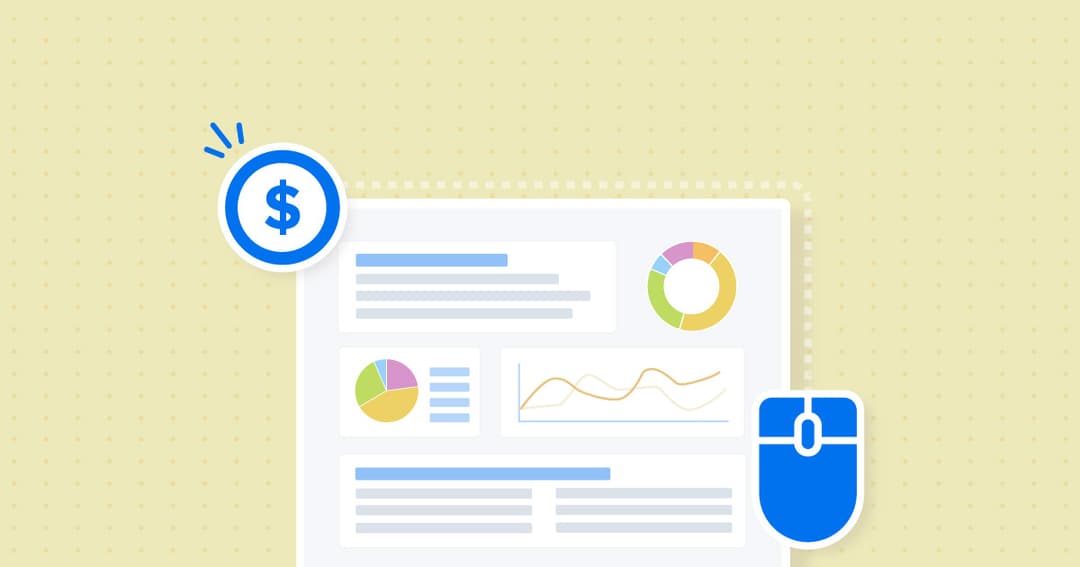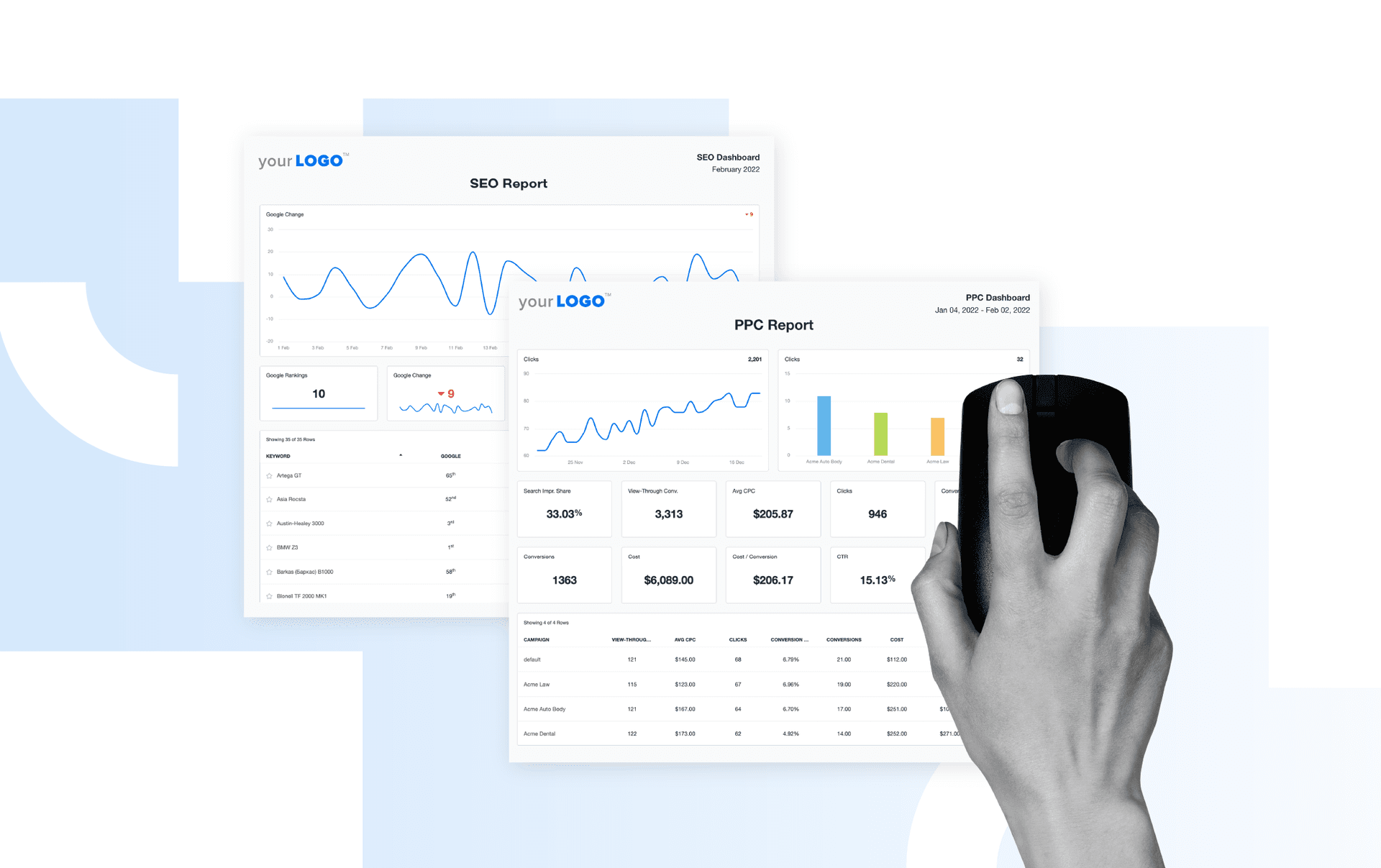Table of Contents
QUICK SUMMARY:
PPC proposals serve as strategic blueprints, tailored to address client-specific pain points and business objectives. Crucial for pitching digital advertising services, a PPC proposal outlines a comprehensive approach that includes competitive analysis, performance evaluation, and actionable solutions. This guide provides insights on creating impactful PPC marketing proposals, featuring a practical proposal template to implement and streamline your agency's sales processes.
Have you ever crafted a PPC proposal and sent it off with high hopes, only to be met with silence?
This situation can leave even the most experienced PPC agencies second-guessing every detail. Was the proposal overly lengthy? Was the budget too high? While there are no guarantees, crafting an effective proposal makes an excellent first impression and increases the likelihood of onboarding new PPC clients.
This process involves more than just putting together a document, though. It requires personalized 1:1 discussions, comprehensive PPC research, and an analysis of each unique situation.
In this article, we’ll explore the key elements of an effective PPC proposal and how to use a pre-built template for greater efficiency. That way, you’ll enhance your current client acquisition strategy and develop a successful upselling process.
Why Is a PPC Proposal Important?
A great PPC proposal isn’t a fly-by-night exercise. It’s a well-thought-out document that clearly defines your client’s pain points and business goals while positioning your agency’s advertising services as the solution.
Whether you’re pitching PPC services to a new prospect or existing client, it’s about showing your agency’s attention to detail and exceptional track record.
To break it down further, a great PPC proposal:
Presents relevant findings (e.g., a PPC competitive analysis).
Factors in a prospect or client’s current PPC performance (if applicable) while highlighting areas for improvement.
Offers a solution based on realistic factors such as a feasible PPC budget or a pre-defined Cost Per Acquisition (CPA) for incoming leads.
Includes actionable steps to get started (e.g., contact information, online sign-offs).
Even if you’ve got the best PPC services in town, remember that this proposal should be centered around your prospect or client. That means you should only pitch what’s absolutely necessary and focus on their unique needs.
Always keep the client's goals in mind when preparing your proposal! If your client's goal is leads, mention how your proposed changes will generate more highly targeted leads. I often see people create generic proposals mentioning their agency’s preferred metrics, not the client’s.
Joseph Blossman Jr., Performance Marketing Manager at Morris Marketing Group
Questions To Ask Before Sending a PPC Proposal
Before mashing the gas on any old PPC proposal, it’s essential to do some groundwork. This step will increase the chances of successfully onboarding potential clients or upselling to existing ones.
Understanding or revisiting client needs, goals, and expectations is the first step to creating a winning PPC proposal.
To get started, here are a few simple questions to ask the client:
Have you advertised online before? If so, what was the outcome?
What does PPC success look like for your business?
Which products or services do you want to promote in PPC campaigns?
Are there specific PPC platforms you’d like to focus on?
Who is your target audience?
What keywords do you think potential customers will use to find your business online (i.e., their search intent)?
Can you identify any keywords or phrases that commonly bring irrelevant traffic or leads to your business (i.e., negative keywords)?
Who are your three top competitors?
What differentiates your business from competitors (i.e., your unique value proposition)?
Use this data to weave a data-driven story of what a potential customer is trying to achieve. Aside from these insights, do your own research that complements their objectives (which we’ll cover next).
Initially, we get the list of primary competitors from the client based on their experience and knowledge of their industry. Next, we explore digital channels such as Google Ads and Semrush. We also check search engine results (organic and paid) for the primary keywords and analyze the top sites.
Pranav Patil, Senior Paid Ads and Measurement Specialist at Ollo Metrics
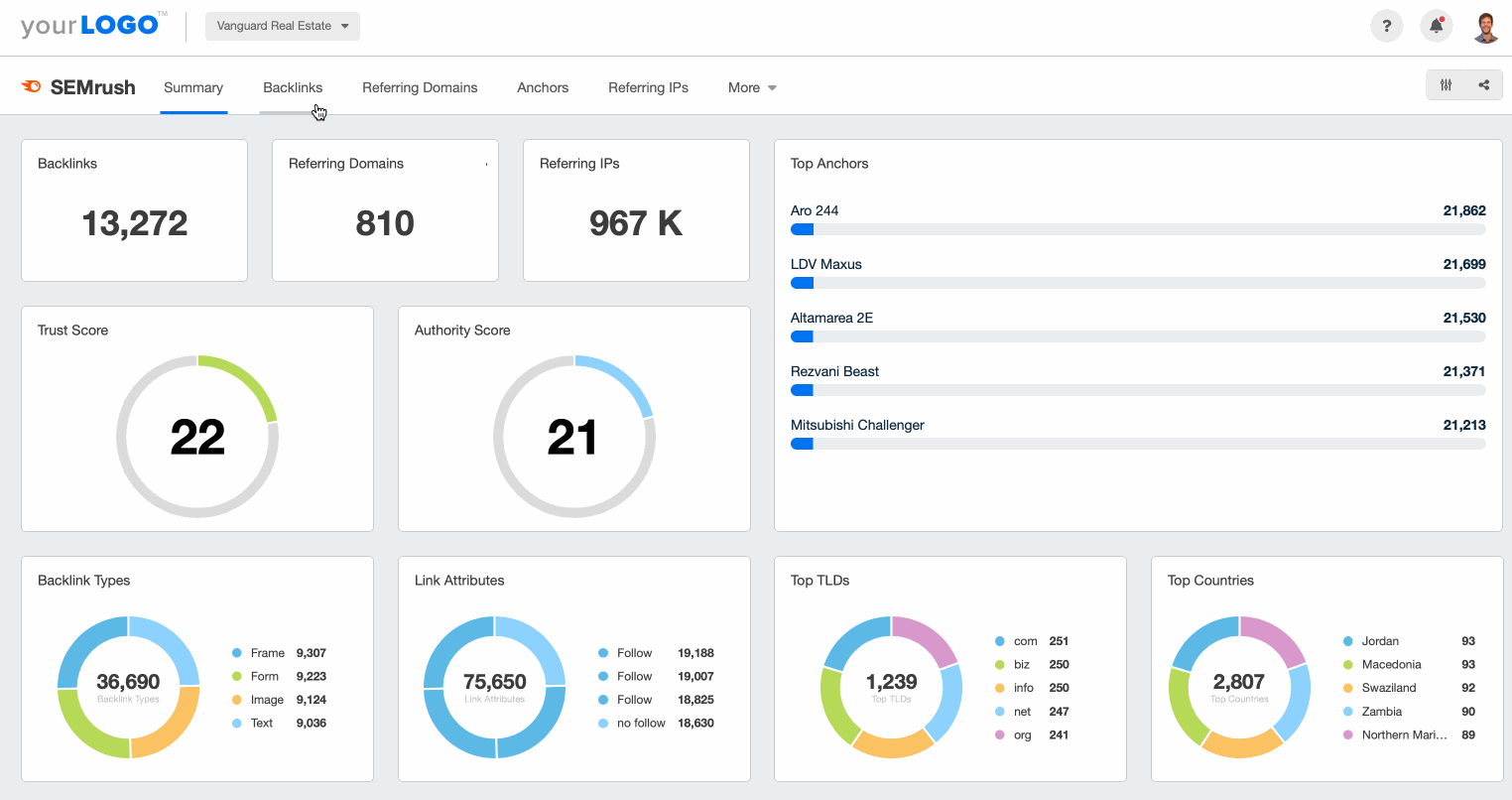
Get insights on competitor websites such as common domains, domain scores, backlink profiles, and more. Try the Semrush integration on AgencyAnalytics; it’s free for 14 days.
Agency Tip: If a new prospect has previously run PPC campaigns, offer to sign an NDA (Non-Disclosure Agreement) for administrative access to their master account. This step will help you do a more thorough audit of their existing campaigns at no charge.
What To Include in a PPC Proposal
Now, on to the meat of the matter–creating PPC proposals.
Here are a few core components to include to help you craft a compelling document that drives decision-makers to say, ‘I accept!’.
A Proposal Summary
Oftentimes, a PPC proposal will be read by a busy prospect or senior-level management (like a CMO or Marketing Manager). Realistically, they may not have time to comb through the entire proposal at once, which is why an executive proposal summary is handy.
This introduction should include an overview of your agency and its services. To supplement this, share your team’s experience–even throw in testimonials from current clients to back up your claims.
Then, provide a summary of your PPC recommendations. This should be based on your prospect or client’s PPC needs (e.g., from a previous discovery meeting), also factoring in recommendations from your independent research.
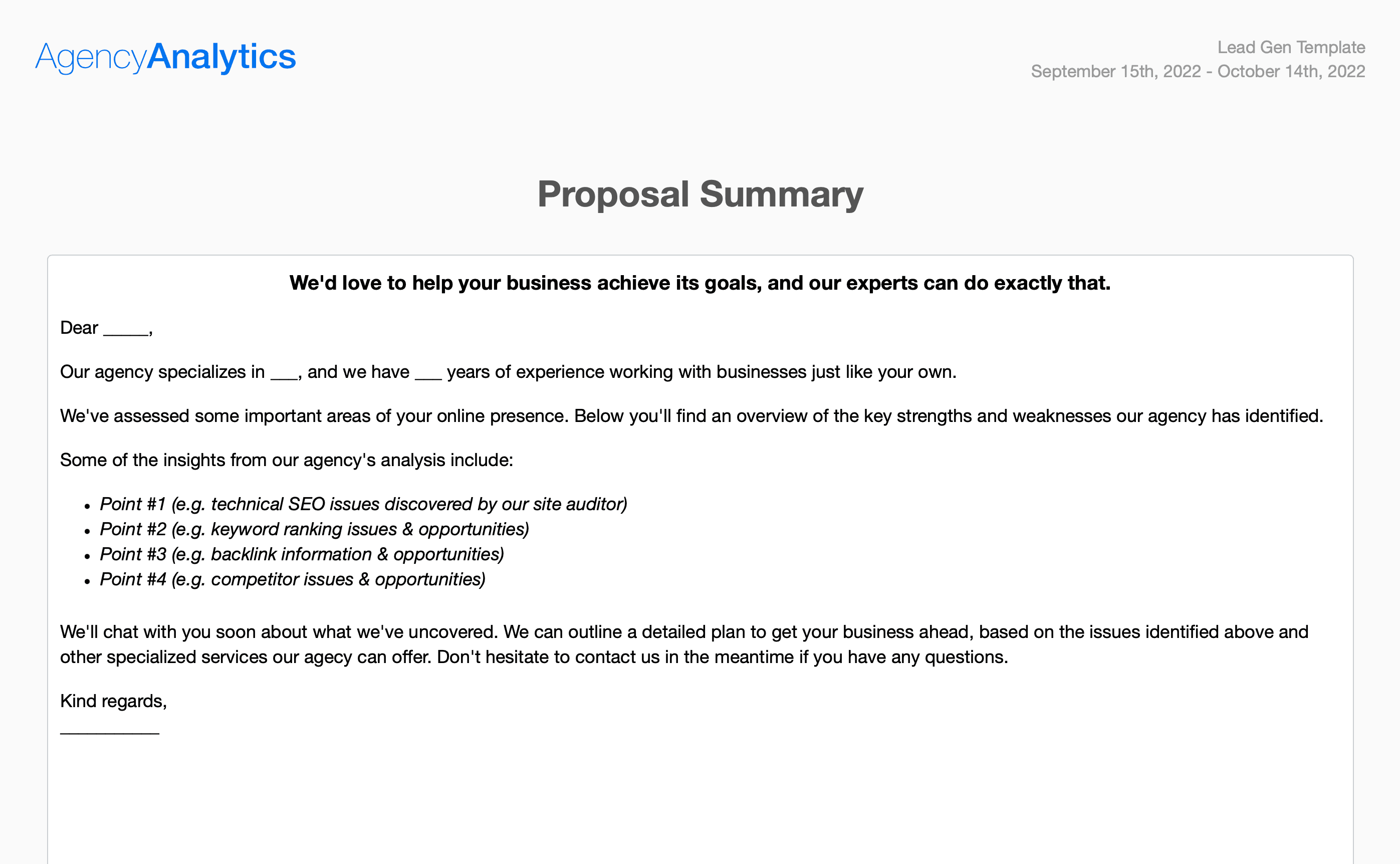
Research Insights
This section should include in-depth paid search analytics and insights about a prospect or client’s website and existing PPC campaigns (if applicable). It’s also an opportunity to conduct a PPC competitive analysis and consider the broader landscape.
Here are a few examples to contextualize this further:
There are issues with their landing pages that could affect getting more conversions (e.g., a missing call-to-action, or ad copy isn’t compelling enough).
After using a competitor analysis tool, it’s clear that other websites are ranking higher for specific keywords or phrases on paid searches. This is an opportunity to explore different keywords or develop a more unique selling proposition.
There are relevant PPC keywords that they aren’t yet capitalizing on, which is an opportunity to re-strategize and meet PPC goals.
Use a tool like Google Keyword Planner to understand key metrics like Cost-Per-Click and search volume for specific keywords. It’s also a useful way to propose a realistic budget by estimating how much competitors are spending.
PPC Competitor Analysis helps understand what platforms competitors are using and what they're doing with respect to targeting, keywords, ad creatives, and formats. It also helps with insights into promos, offers, and landing page design.
Stuart Pereira, Campaign Manager of Paid Marketing at WSI Comandix
Impress clients and save hours with custom, automated reporting.
Join 7,000+ agencies that create reports in under 30 minutes per client using AgencyAnalytics. Get started for free. No credit card required.
A PPC Strategy
Next up, it’s time to share the ins and outs of your proposed PPC strategy. To organize this information effectively, here are a few components to include.
Recommended PPC Platforms
When suggesting advertising platforms, tailor recommendations to your client or prospect's unique preferences and needs.
Suggest different advertising platforms that align better with any budget constraints or specific targets, if applicable. For example, a prospect with a brand awareness goal and a modest budget may get more traction from Facebook Ads vs. Google Ads.
A few examples of popular PPC platforms include:
Google Ads (formerly Google AdWords)
Microsoft Ads (formerly Bing Ads)
If you’re pitching to a new prospective client, consider mentioning how you’ll track results (e.g., using a real-time PPC dashboard) and give a preview.

Show prospective clients what your agency is capable of. Include a sample PPC dashboard that gives a preview of the reporting process–track real-time PPC data on AgencyAnalytics, free for 14 days.
Campaign Goals and Objectives
Clearly outline the specific goals of a proposed PPC campaign while aligning it to a broader business objective.
To contextualize this further, here are some examples of PPC goals and objectives:
Brand Awareness: Increase paid traffic for a specific product using Bing Ads to achieve 500,000 impressions in two months.
Lead Generation: Generate 1000 more leads per quarter for a B2B service through a LinkedIn Ads PPC campaign.
E-commerce Sales: Boost online sales by 20% over the next six months for an e-commerce store through video campaigns on Instagram.
Customer Acquisition: Acquire 500 new customers for a subscription-based service through targeted Facebook PPC ads in four months.
A Budget and Bidding Strategy
The next step is to create a realistic budget and bidding strategy that aligns with exactly what goals the client wants to achieve while integrating insights from your previous research.
Everything we do is tied to that specific business's growth strategy. Based on the goals in their growth strategy, we would determine the type of campaign. From there, we could dive into specific bidding and keyword strategies. By setting a solid foundation for our clients, we attain better long-term results.
Sara Kremm, Senior Paid Media and Conversion Specialist at OTM
Include a breakdown of recommended keywords or phrases and their associated costs. For a PPC campaign focused on lead generation, specify the estimated Cost Per Lead based on your analysis.
Additionally, explain your proposed bid optimization strategy. For example, if you're recommending an Impression Share bidding strategy to augment brand visibility, explain how this approach aligns with the campaign's overall goals.
This detailed breakdown enhances clarity and helps a prospect or client understand the rationale behind your recommendations.

Create visual, dynamic goals and monitor how PPC ad spend is pacing. Explore a range of PPC reporting features on AgencyAnalytics–it’s free for 14 days.
Next Steps
This is the final part of your proposal, which summarizes the gist of the proposal and the best ways to contact you.
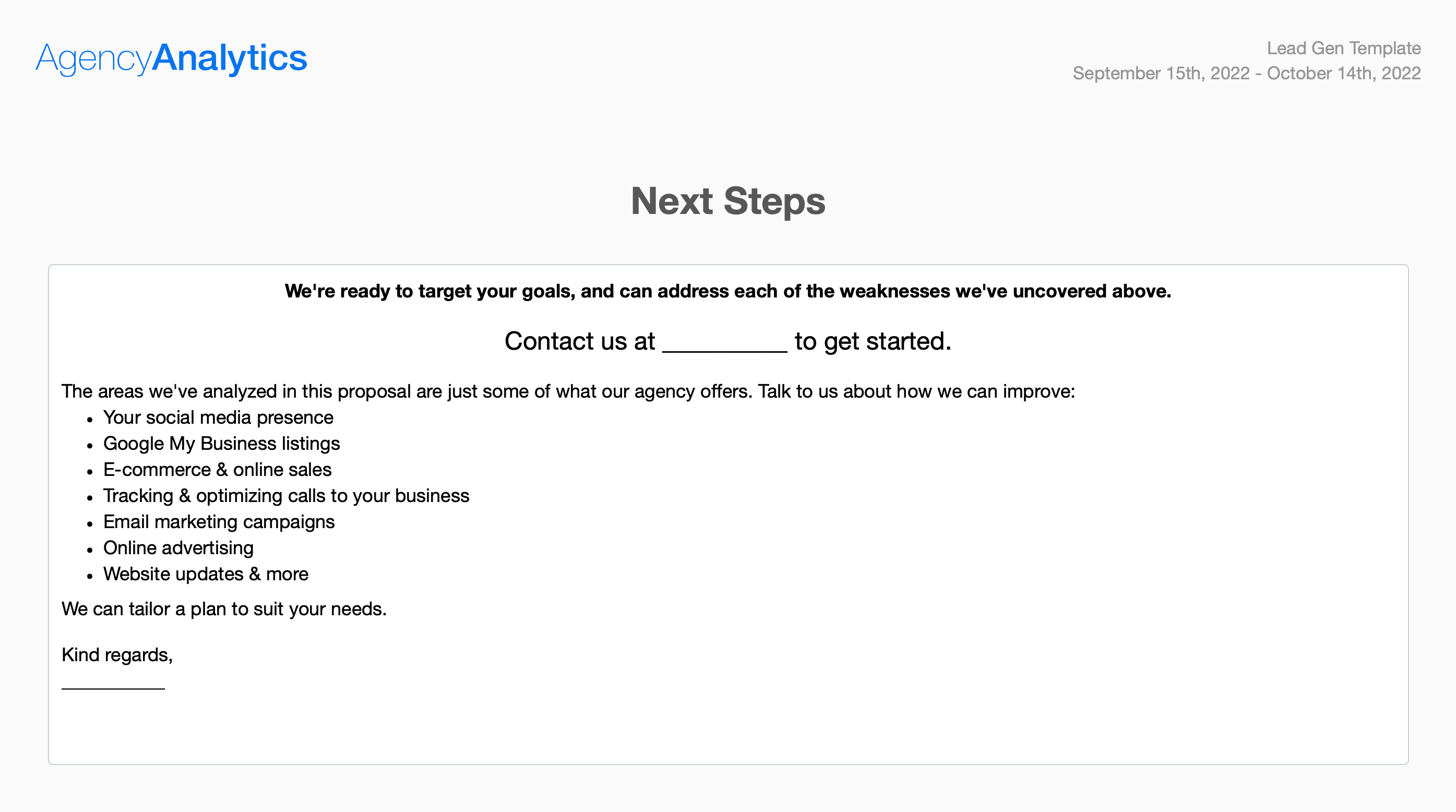
That said, the last thing you want is a solid PPC proposal sitting in a prospect’s inbox.
To avoid this from happening, set a deadline. Give your prospect sufficient time to consider the proposal, but also create a sense of time urgency to encourage decision-making.
To quell any doubts, send any compelling data that strengthens the basis of your proposal and shows what you’re capable of delivering.
We often see proposals expire because our clients can't make a decision. You don't want to come off as too pushy, but you also don't want to let off the gas. If something will truly benefit your client and they just won't pull the trigger, don't let up. Send them the results of other clients having success in this space or 3rd party articles spelling out the benefits of the services in question. These can be subtle reminders to them to make a decision.
Jason Willis, Creative Director of Social Firm
Another tactic is offering a discounted rate or additional services if they sign up within a specific time frame.
This strategy is especially useful when upselling PPC services to current clients. In this scenario, propose a package that integrates seamlessly with the services they already receive from you at a better cost.
Use a Fully Customizable PPC Proposal Template To Save Time
While it’s possible to develop a fresh PPC proposal template each time, is it the most efficient approach?
Repeatedly creating unique proposal templates from scratch is time-consuming, especially when you’re juggling other demands.
There’s a better solution–try a free PPC proposal template on AgencyAnalytics. All you have to do is sign up for a risk-free 14-day trial.
This pre-built PPC proposal template includes everything you need to start, including all the components we’ve outlined.
It’s a versatile document that makes it easy to tailor for each prospect or client. For example, let’s say you’re sending a preliminary PPC proposal with a couple of recommendations. If your prospect decides to proceed, simply expand on this existing proposal as needed (e.g., adding timelines for deliverables).
Here’s another scenario–let’s say you’ve got an existing PPC client. If you’re looking for a neat way to upsell services, you don’t necessarily need to create a separate proposal.
Simply use AgencyAnalytics' PPC report template to customize their existing PPC report (e.g., adding a text box with suggestions).
All-in-one PPC reporting has never been easier!
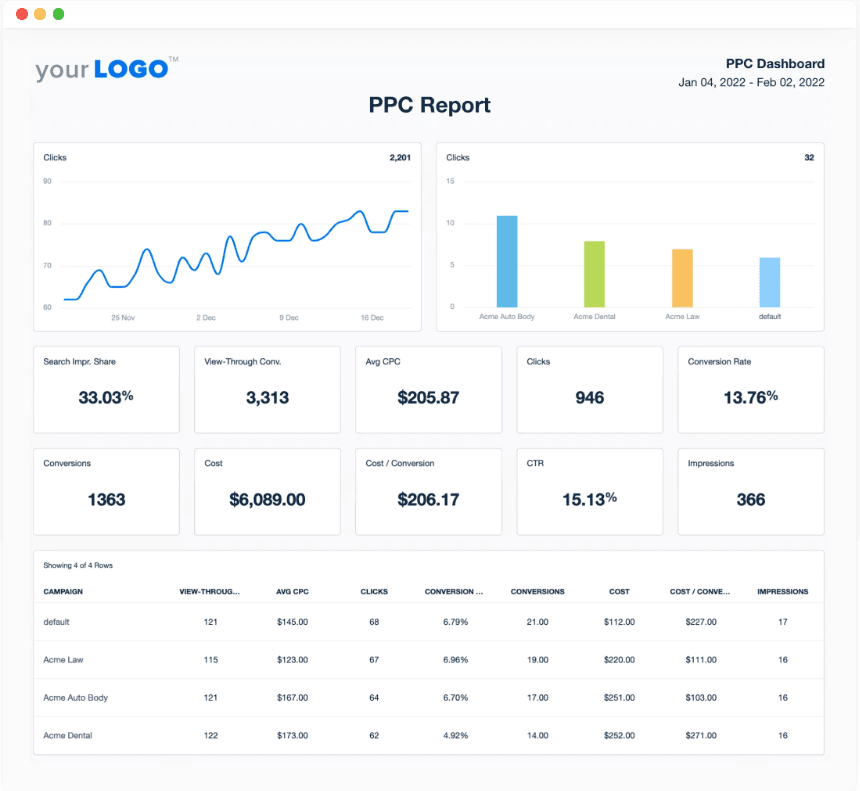
Got PPC reports to send each month? Automate data retrieval, use pre-built reporting templates, and streamline campaign management–try AgencyAnalytics today, free for 14 days.
A Suite of PPC Reporting Features at Your Fingertips
Crafting a PPC proposal isn’t a passive process. It’s about understanding needs, monitoring the landscape, and developing a realistic solution.
As a quick recap, remember to:
Start with a concise overview.
Present extensive research insights, like a competitor analysis.
Break things down in dollars and cents (e.g., calculating a Cost Per Conversion for specific keywords).
Recommend a realistic PPC marketing strategy.
Include time-sensitive incentives or provide deadlines to encourage decision-making.
Use a pre-built PPC proposal template that’s easily replicable and customizable.
Showing how your agency handles PPC reporting builds trust and demonstrates your ability to drive success over the long term.
Use a tool like AgencyAnalytics to successfully pitch your agency’s PPC capabilities, close more deals, and combine data across 80 marketing platforms–all in one place.
Want more in-depth insights about lead generation templates? Check out the on-demand webinar below, or sign up for a free 14-day trial of AgencyAnalytics today.

Written by
Faryal Khan is a multidisciplinary creative with 10+ years of experience in marketing and communications. Drawing on her background in statistics and psychology, she fuses storytelling with data to craft narratives that both inform and inspire.
Read more posts by Faryal KhanSee how 7,000+ marketing agencies help clients win
Free 14-day trial. No credit card required.



